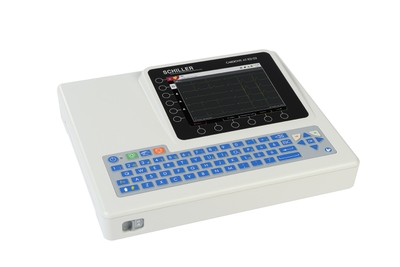
Medical rehabilitation ergometer ERG 911 L
- On order
Department specialist consultation
+38 (068) 165 87 94| Direction: | Rehabilitation |
|---|---|
| Producer: | SCHILLER |
| Country: | Switzerland |
ERG 911 L
The ERG 911 L recumbent/semi-recumbent safety ergometers are specially designed for use in cardiology.
In some cases, the use of a lying/semi-lying ergometer is recommended for safety reasons when performing a stress test: for example, in patients with suspected cardiovascular problems after myocardial infarction or aorto-coronary bypass surgery, or when examining elderly patients or patients with musculoskeletal limitations. The optimal positioning of the patient on a horizontal or inclined surface ensures a test quality identical to that of a conventional seated ergometer.
FEATURES
- Two modes of operation:
- Remote control from the head unit (ECG, PC, ...)
- Stand-alone control via a user-defined step protocol or with manual load adjustment - Infinite adjustment of the couch position by means of an electric motor (0° - 45°).
- Height adjustment of the seat and headrest by means of an electric motor
- Accurate BP measurement device with arm support (optional)
- Bluetooth or RS-232 connection
- Virtually silent operation of the drive mechanism even at high speeds
- Sturdy, stable design for patients weighing up to 160 kg
- Comfortable getting on and off the ergometer
Possible indications for ECG with load
- Diagnostic clarification of chest pain (angina pectoris, including vasospastic angina) in myocardial ischemia (insufficient blood supply) or coronary heart disease
- For patients with cardiac risk factors, such as suspected coronary heart disease and hypertension (high blood pressure)
- After a myocardial infarction to assess prognosis, physical activity, medical treatment and cardiac rehabilitation
- Before and after revascularization (restoration of blood supply) using interventional methods or coronary artery bypass grafting surgery to assess residual ischemia
- Assessment of exercise capacity, e.g. for expert reports
- Examinations of men over 40 years of age or women over 50 years of age who are asymptomatic before exercise
- For professions where the medical condition affects public safety (e.g. bus drivers, pilots, ...)
- For patients with cardiac arrhythmia that manifests itself only during physical activity (e.g. ventricular tachycardia in case of arrhythmogenic right ventricular disease, coronary heart disease)
Indications for cardiac rehabilitation
- previous heart attack
- stable angina pectoris
- coronary artery bypass grafting
- cardiomyopathy
- PCI (percutaneous coronary intervention)
- compensated heart failure
- Patient weight:160
- Medical institutions
- Rehabilitation centers
.jpg)